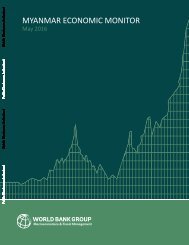Myanmar
1WZPRL1Jj
1WZPRL1Jj
- No tags were found...
You also want an ePaper? Increase the reach of your titles
YUMPU automatically turns print PDFs into web optimized ePapers that Google loves.
CHAPTER 1. Business environment<br />
was assessed for the first time in 2013, it was ranked<br />
at 139 out of 148 countries (WEF, 2013); however,<br />
since then its ranking has advanced to 134 of 144<br />
countries (WEF, 2014). However, challenges still remain<br />
as the country ranks beyond 100 in all pillars apart<br />
from labour market efficiency and market size. The<br />
labour market is ranked at 72, mainly driven by flexible<br />
wage determination and the high female-male ratio<br />
in the labour force (WEF, 2014). Market size refers<br />
to the domestic market, as the export market is not<br />
well-developed. During 2013-2014 the country has seen<br />
improvements in all pillars except health and primary<br />
education where its rank has been downgraded from<br />
111 out of 148 countries to 117 out of 144 (WEF,<br />
2013 and 2014).<br />
A key ingredient of the Global Competitiveness Index<br />
is the Executive Opinion Survey which captures the<br />
opinion of business leaders from around the world<br />
on a broad range of topics. In the latest survey in<br />
<strong>Myanmar</strong>, a total of 165 leaders were asked to name<br />
the issues they believed were most problematic for<br />
conducting business in <strong>Myanmar</strong>. Access to finance,<br />
corruption and inefficient bureaucracy topped the list,<br />
followed by lack of skilled workers and unstable policies<br />
(WEF, 2014). The detailed results of the Executive<br />
Opinion Survey are presented in figure 1.3.<br />
The World Bank’s annual “Doing Business” report<br />
conducts a comprehensive survey of business<br />
conditions in more than 180 countries. It reviews<br />
quantitative indicators on regulatory conditions faced<br />
by a local SMEs by tracking changes in regulations<br />
affecting 11 areas in the operations of a business:<br />
(a) starting a business; (b) dealing with construction<br />
permits; (c) getting electricity; (d) registering property; (e)<br />
getting credit; (f) protecting investors; (g) paying taxes;<br />
(h) trading across borders; (i) enforcing contracts; (j)<br />
resolving insolvency; and (k) employing workers (World<br />
Bank, 2013). The report provides policymakers with a<br />
useful view of the position of their country compared to<br />
other countries in the region. As shown in figure 1.4,<br />
<strong>Myanmar</strong> is lagging behind its neighbours considerably<br />
(World Bank, 2014a). The distance from the frontier<br />
Figure 1.3. The most problematic factors in doing business in <strong>Myanmar</strong><br />
Access to financing.......................................................18.0<br />
Corruption.....................................................................13.9<br />
Inefficient government bureaucracy................................9.7<br />
Inadequately educated workforce...................................8.7<br />
Policy instability...............................................................8.6<br />
Inadequate supply of infrastructure.................................7.1<br />
Foreign currency regulations...........................................6.2<br />
Tax regulations................................................................4.8<br />
Inflation...........................................................................4.0<br />
Government instability/coups..........................................3.8<br />
Poor work ethic in national labour force..........................3.8<br />
Restrictive labour regulations..........................................3.8<br />
Tax rates..........................................................................3.3<br />
Insufficient capacity to innovate......................................2.1<br />
Crime and theft................................................................1.6<br />
Poor public health............................................................0.6<br />
0 5 10 15 20 25 30<br />
Percentage of respondents<br />
Source: WEF, 2014.<br />
Figure 1.4. <strong>Myanmar</strong> lagging behind its neighbours in doing business<br />
Malaysia (ranking 18)<br />
Thailand (ranking 26)<br />
78.8<br />
75.3<br />
ESCAP Average (ranking 88)<br />
China (ranking 90)<br />
Indonesia (ranking 144)<br />
India (ranking 142)<br />
Lao PDR (ranking 148)<br />
63.5<br />
62.6<br />
59.2<br />
54.0<br />
51.5<br />
<strong>Myanmar</strong> (ranking 177)<br />
43.6<br />
0 20 40 60 80 100<br />
Distance to frontier score<br />
Sources: Doing business database; authors’ calculations.<br />
9







